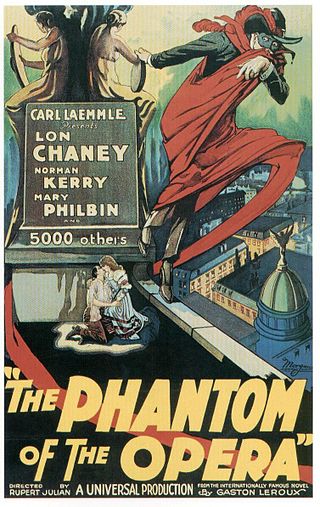
The Phantom of the Opera is a 1925 American silent horror film adaptation of Gaston Leroux's novel of the same name directed by Rupert Julian and starring Lon Chaney in the title role of the deformed Phantom who haunts the Paris Opera House, causing murder and mayhem in an attempt to make the woman he loves a star. The film remains most famous for Chaney's ghastly, self-devised make-up, which was kept a studio secret until the film's premiere. The picture also features Mary Philbin, Norman Kerry, Arthur Edmund Carewe, Gibson Gowland, John St. Polis and Snitz Edwards. The last surviving cast member was Carla Laemmle (1909–2014), niece of producer Carl Laemmle, who played a small role as a "prima ballerina" in the film when she was about 15 years old. The first cut of the film was previewed in Los Angeles on January 26, 1925. The film was released on September 6, 1925, premiering at the Astor Theatre in New York.
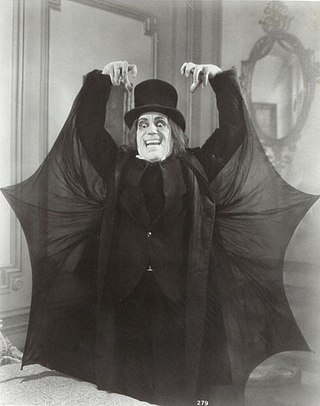
A lost film is a feature or short film in which the original negative or copies are not known to exist in any studio archive, private collection, or public archive. Films can be wholly or partially lost for a number of reasons. Early films were not thought to have value beyond their theatrical run, so many were discarded afterward. Nitrate film used in early pictures was highly flammable and susceptible to degradation. The Library of Congress began acquiring copies of American films in 1909, but not all were kept. Due to improvements in film technology and recordkeeping, few films produced in the 1950s or beyond have been lost.

The Battle of the Century is a 1927 American silent short film starring comedy double act Laurel and Hardy, who appeared in 107 films between 1921 and 1951. The film entered the public domain in the United States in 2023.
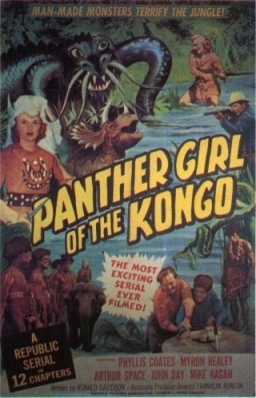
Panther Girl of the Kongo is a 1955 Republic movie serial that contains a great deal of stock footage from the 1941 Republic serial Jungle Girl. This was the penultimate of Republic's 66 serial films.
Blackhawk Films, from the 1950s through the early 1980s, marketed motion pictures on 16mm, 8mm and Super 8 film. Most were vintage one- or two-reel short subjects, usually comedies starring Laurel and Hardy, Our Gang, Charlie Chaplin, Buster Keaton, and other famous comedy series of the past. Blackhawk also offered newsreels, documentaries, and silent feature films. With the rise of the video market in the early 1980s, Blackhawk began producing video versions of many of their titles in 1981 and within a few years no longer manufactured film copies. The company was later purchased by Republic Pictures in 1985, and the film elements still later by archivist David Shepard.

The Lone Defender is a 1930 American Pre-Code Mascot serial film starring Rin Tin Tin. It was Mascot's first all-sound serial. It was Rin Tin Tin's first serial at Mascot, after being dropped by Warner Bros. when they decided animal pictures would not work with "Talkies". He also starred in the later serial The Lightning Warrior, which was his last appearance.
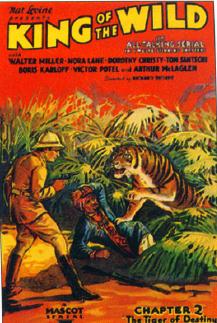
King of the Wild is a 1931 American pre-Code Mascot movie serial. The complete serial is available on DVD from Alpha Video.

Mascot Pictures Corporation was an American film company of the 1920s and 1930s, best known for producing and distributing film serials and B-westerns. Mascot was formed in 1927 by film producer Nat Levine. In 1935, it merged with several other companies to form Republic Pictures.

Tarzan the Tiger (1929) is a Universal movie serial based on the novel Tarzan and the Jewels of Opar by Edgar Rice Burroughs. It stars Frank Merrill as Tarzan, Natalie Kingston as Jane, and Al Ferguson. It was directed by Henry MacRae.

Tarzan the Mighty is a 1928 American silent action film serial directed by Jack Nelson and Ray Taylor. It was nominally based on the collection Jungle Tales of Tarzan by Edgar Rice Burroughs. The film is now considered to be lost.

Perils of the Wild is a 1925 American silent adventure film serial directed by Francis Ford. The film is considered to be lost. This serial was based on the 1812 novel The Swiss Family Robinson by Johann David Wyss.

The Masked Rider is a 1919 American silent Western film serial directed by Aubrey M. Kennedy. Scenes were filmed in Mission San Jose in San Antonio, Castroville and Bandera, Texas, and in Coahuíla, Mexico. The serial was long thought to be lost in entirety.

His Majesty, the American is a 1919 American silent comedy film directed by Joseph Henabery and starring Douglas Fairbanks. It was the first film produced for distribution by United Artists, and was released in the U.K. as One of the Blood. Prints exist in the film holdings of Cohen Media Group [a 35mm positive]; in the film holdings of EmGee Film Library [a 16mm reduction positive]; and in private film collections [a 16mm reduction positives].

The Adventures of Tarzan (1921) is a 15 chapter movie serial which features the third and final appearance of Elmo Lincoln as Tarzan. The serial was produced by Louis Weiss, written by Robert F. Hill and Lillian Valentine, and directed by Robert F. Hill and Scott Sidney. The first chapter was released on December 1, 1921.

Louis Weiss was an American independent producer of low-budget comedies, westerns, serials, and exploitation films.
Two Lovers is a 1928 American synchronized sound historical drama film directed by Fred Niblo. While the film has no audible dialog, it was released with a synchronized musical score with sound effects using both the sound-on-disc and sound-on-film process. The film stars Vilma Bánky, Ronald Colman, and Noah Beery. Based on the novel Leatherface: A Tale of Old Flanders by Baroness Emma Orczy, it was produced by Samuel Goldwyn.

Stark Mad is a 1929 American pre-Code adventure film produced and distributed by Warner Bros., directed by Lloyd Bacon, and starring H. B. Warner, Louise Fazenda, Jacqueline Logan and Henry B. Walthall. This lurid jungle melodrama was an attempt to emulate the then-popular jungle horror films being made at the time by Tod Browning and Lon Chaney. The film was unusual in that it is set in the jungles of Central America rather than Africa.
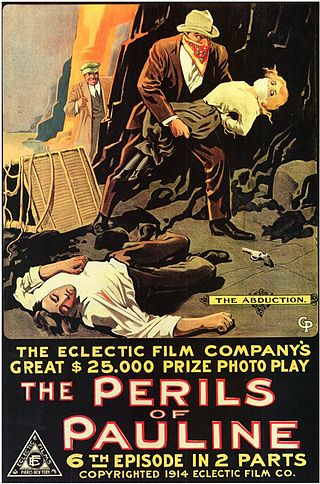
A serial film,film serial, movie serial, or chapter play, is a motion picture form popular during the first half of the 20th century, consisting of a series of short subjects exhibited in consecutive order at one theater, generally advancing weekly, until the series is completed. Usually, each serial involves a single set of characters, protagonistic and antagonistic, involved in a single story, which has been edited into chapters after the fashion of serial fiction and the episodes cannot be shown out of order or as a single or a random collection of short subjects.















